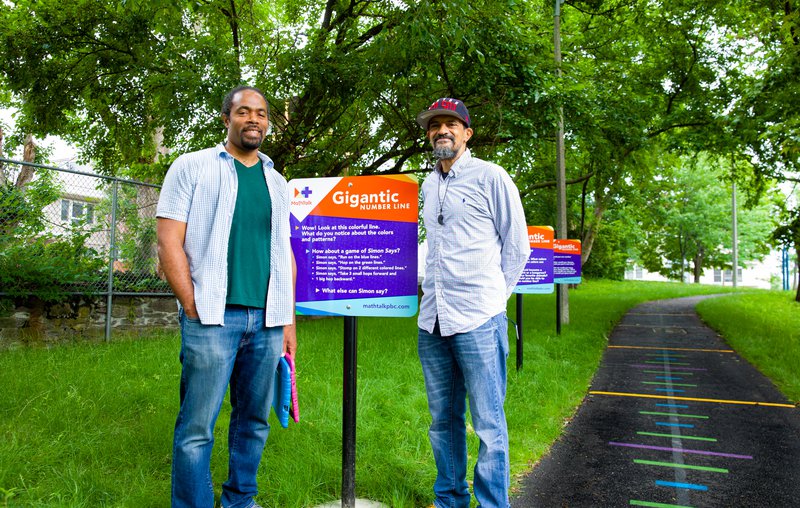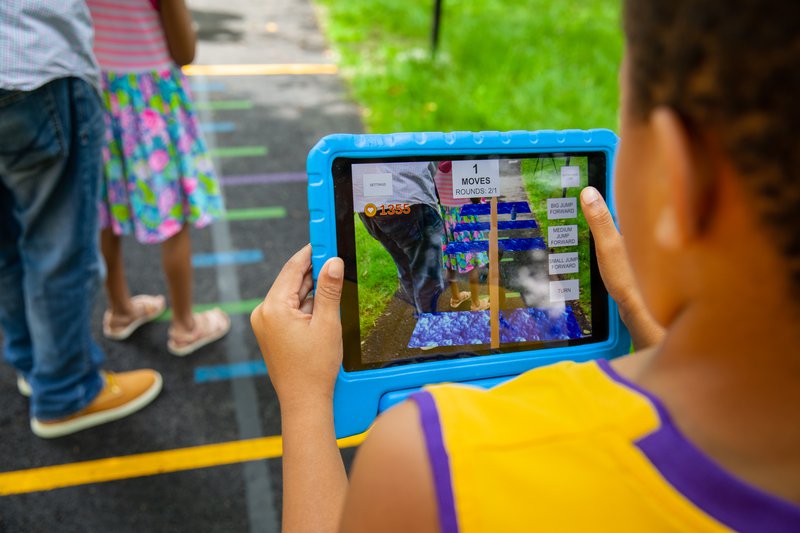Helping Kids—and Parents—See that Math is All Around Us
Chances are, math makes you a little uncomfortable. More than
nine in 10
adult Americans indicate that they experience some level of math anxiety. Yet, our daily lives are shaped by countless examples of math.
“Every time you’re cooking, you’re doing math,” says Omo Moses, the founder and CEO of MathTalk, an education startup aimed at engaging young learners and their families in exploring math concepts.
For children, who absorb their emotional and physical surroundings, math anxiety among the adults in their lives can seep into their learning, especially in their crucial early years, which can have lifelong ripple effects. Starting young children off on the right foot with math has been shown to be a better predictor of success than early reading, but American children regularly underperform on math assessments, compared with children in other countries.
MathTalk, which uses a mix of technology and math-focused installations, harnesses playful learning to reduce math anxiety and create positive math experiences for kids and their parents, particularly in communities with fewer educational resources.
Math Literacy is The Family Business
Omo created MathTalk based on the belief that math is everywhere and can be used by anyone to better understand the world, a view instilled in him by his father, Robert Moses, a civil rights leader, a MacArthur “Genius” Fellow and the founder of The Algebra Project, a math literacy nonprofit for children of color. Omo joined his father at The Algebra Project when he graduated from college.
The elder Moses saw math literacy as the key to economic mobility among people of color, especially as technology-based jobs began outnumbering traditional industrial jobs. “People clearly understand that education is a kind of vehicle for upward mobility,” Omo says. “Within that, math has become much more important for people to be able to have that same type of upward mobility.” Yet, research shows that math education is less accessible to Black and Latinx students and the way it is taught may favor white students.
While working with his father at The Algebra Project, Omo learned a lot about what barriers keep students from embracing math. The way most of us learn math is through memorization, but to Omo, math is a language, a way to explore ideas and discover new things. “Math is something to be curious about and it's a way to begin to explore things that you're curious about.”
Math can also open up new worlds for children, especially children of color or those who live in economically disadvantaged areas. Omo points to his experience growing up in Cambridge, Massachusetts, surrounded by Harvard University, Massachusetts Institute of Technology and the biotech industry: “When I was a kid, I couldn't see those spaces as opportunities for me. And I know most kids don't see those spaces as opportunities for them.”

Why We Invested: Transforming Math Education for a New Era of Learning
With a focus on intergenerational learning, co-designing with the insight and buy-in of community members, and a clear equity lens on math literacy for early learners, MathTalk’s innovative products align with Imaginable Futures’s strategy for our littlest learners. MathTalk embraces the time in a child’s life with the biggest opportunities to create a learning foundation. We are thrilled to invest in MathTalk’s growth, especially at a time when the COVID-19 pandemic has disrupted learning and exacerbated the educational inequities faced by children of color and those from low-income backgrounds.
MathTalk has always used a mix of digital tools and physical installations to help young learners see their environment through a math lens. When the pandemic pushed many children indoors, MathTalk invested in improving its technology and creating a new app, Measure! Everything!, which, true to the name, encourages kids to explore measurement of the world around them in a playful format. The app uses augmented reality, which research has shown helps children engage more deeply with the subject matter and, in the case of math specifically, helps reduce math anxiety by giving young children a positive, fun experience with math.
As parks are increasingly seen as learning spaces, MathTalk is also expanding its footprint of physical installations in public spaces, building on its commitment to connecting learning between the classroom, the home and the community.
As you learn and see math around you, and you're able to interact and engage with it, a world opens up.
Omo Moses, founder and CEO, MathTalk

MathTalk’s value proposition to build stronger connections between adults and children through math oriented, community-embedded interactions that blend augmented reality and physical play is unique in the for-profit edtech market. Many math-focused apps for kids do not have a parent-facing component or are intended for older children, while parent support apps and apps that encourage deeper engagement with physical surroundings do not often focus specifically on math.
Helping kids and parents explore math together may also have a more profound effect than just improved math literacy, according to Omo. “As you learn and see math around you, and you're able to interact and engage with it, a world opens up.”